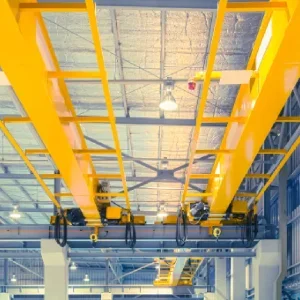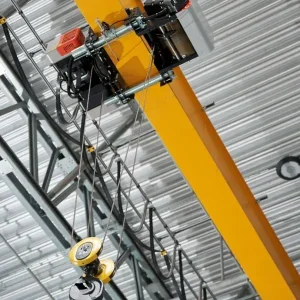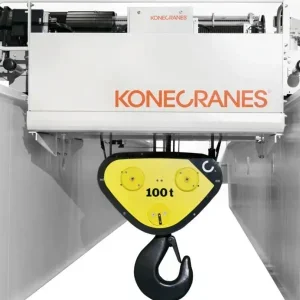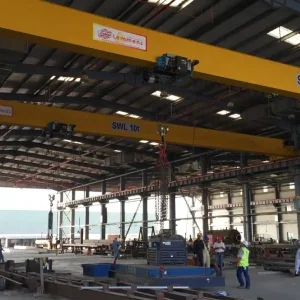Street Crane Company was founded in 1947. By a substantial margin they are the UK’s largest industrial crane and hoist manufacturer, producing around 400 complete overhead travelling cranes per year for the UK market. In addition, the business ships around 2,500 crane hoists from their Derbyshire (Chapelen- le-Frith) factory. Around 70 per cent of their £25m turnover comes from export, mainly of hoists and other high value crane components, to a network of 60 trade resellers around the world. The majority of the company’s resellers are crane manufacturers focused on their own national markets.
Its partner K2 Cranes is a division of the privately owned Karthigeya Group, based in Chennai in the state of Tamil Nadu in India. A private company, Karthigeya was founded in 1985 and has major interests in mould and die production for the plastic moulding industry and in the production of injection moulded plastic components. The majority of the mouldings that the company produces are for automotive and electrical product producers.
Karthigeya Group has a turnover of $22m with plans to boost this to $50m in the next 3–5 years. A key element in this is the development of the K2 crane business. In three years this has grown from zero to an output of 200 cranes per year. To support further growth the company has invested in a new purpose built 45,000sq ft factory with adjoining stock yard and dispatch area. This occupies less than half of a substantial site so there is room for expansion. The new site has three box beam beds, with pneumatic clamping for the production of crane bridges. Three separate bays, with advanced welding equipment provide capacity for simultaneous crane fabrication, assembly, testing and shipping. An existing factory in Chennai has been retained and will be dedicated to the production of end carriages.
India is expanding and opening up. Projected economic growth this year is 8.6 per cent and per capita income growth is expected to rise by 17.3 per cent. The greater Chennai area and state of Tamil Nadu have nurtured many high growth companies like Karthigeya. The area has also attracted substantial inward investment from companies such as BMW, Hyundai, Ford, Nissan-Renault and others.
With economic growth and inward investment has come a change in expectations. Manufacturers in India demand quality crane equipment that delivers higher performance, reliability and durability. This has created an opening for K2 Cranes to meet these needs and distinguish themselves from scores of small local low-end crane manufactures offering a limited range of basic cranes and hoists at low cost.
The two businesses have much in common. Both companies are privately owned and free from the short-term external pressures experienced by listed companies. They each have a commitment to reinvestment and business growth with a track record of delivering on their business plans.
There is cultural and commercial alignment. India uses English as its default business language, operates the same technical and quality standards and has compatible codes of law and accountancy practices. This has enabled both parties to achieve a level of understanding that is not so easily attained where cultures and business practices differ.
K2 uses Street Crane’s hoisting equipment exclusively. Kits from the UK are assembled in the Chennai works and fitted to cranes that are shipped to site with Street Crane branding as a mark of quality. The association between the companies is close and the new factory carries Street Crane branding alongside its primary K2 signage.
The two companies are currently working on a joint business plan. This will involve engineers and executives from K2 visiting the UK to see and evaluate how they can tap into Street Crane’s sector expertise, including the use of exclusive design software for crane bridge fabrication. The companies plan to make their working relationship deeper and stronger.
Street Crane managing director, Andrew Pimblett predicts that K2 will become his largest customer in the near future. This is based on K2’s ambitious plans for growth that foresee crane production of 500 units per year within five years.
Andrew Pimblett explains, “As in other BRIC countries, what we see in India is two crane markets. The traditional crane market is based around low price, basic technology products that have a high lifetime cost. Alongside this there is a growing market for higher specification cranes that incorporate the latest western technology, where higher cost is offset by more reliable performance and lower life time cost. The driver for the Street/K2 Partnership is the astonishing speed at which Indian purchasers are changing their perception of cost, quality and safety.”






